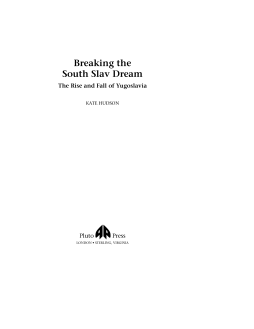
Additional Information
Book Details
Abstract
This is a revisionist history of the rise and fall of Yugoslavia. Assessing the geopolitical and strategic reasons for its creation and dismemberment, it is an important corrective to much contemporary theorising about the destruction of the Yugoslav state.
Kate Hudson draws attention to the role of foreign states whose involvement in Yugoslavia did much to destabilise the region, and explains how and why this happened.
Tracing the state's origins from 1918 through war and the Tito years, she explains the distortion of the socialist economy resulting from Yugoslavia's unusual position between the two Cold War blocs, and the economic collapse of the 1980s as part of the US's drive for a free market. She also investigates the true causes and effects of the recent wars in Croatia, Bosnia and Kosovo and brings the book up-to-date with an analysis of Milosevic's downfall, and events in Macedonia and Montenegro.
'Read this book. It is the answer to the misinformation and lies about Yugoslavia that we have had to bear over the last decade'
Morning Star
Table of Contents
| Section Title | Page | Action | Price |
|---|---|---|---|
| Contents | v | ||
| Introduction | 1 | ||
| 1 The first Yugoslavia: origins and problems | 8 | ||
| Yugoslavism and the origins of the state | 9 | ||
| The war and its outcome | 12 | ||
| Economic challenges in nation- building | 15 | ||
| Political challenges in nation- building | 18 | ||
| Peasants and communists | 20 | ||
| Absolute rule | 23 | ||
| 2 The Second World War | 26 | ||
| The eve of war | 27 | ||
| Division and occupation | 29 | ||
| Resistance | 31 | ||
| The cost of the war | 37 | ||
| 3 The Tito years | 39 | ||
| Establishing the new state | 40 | ||
| The split with the Soviet Union | 42 | ||
| Self- management | 45 | ||
| Non- alignment | 48 | ||
| Nations and constitutions | 50 | ||
| Reasserting communist authority | 54 | ||
| 4 Economic assault: the 1980s and the US drive for a free market | 56 | ||
| Economic instability | 58 | ||
| Political instability | 62 | ||
| The question of Kosovo | 64 | ||
| Milosevic | 68 | ||
| 5 Crisis response | 73 | ||
| Political change in Slovenia | 75 | ||
| Multi- party elections | 78 | ||
| Breakdown | 82 | ||
| Slovenian secession | 86 | ||
| 6 War: the first wave Croatia | 89 | ||
| International interests | 91 | ||
| Conflict with the JNA | 92 | ||
| Negotiation and recognition | 98 | ||
| 7 War: the second wave Bosnia | 103 | ||
| The question of Islam | 105 | ||
| The build- up to war | 109 | ||
| The war begins | 112 | ||
| The final stages | 119 | ||
| The Dayton Accords | 120 | ||
| 8 War: the third wave Kosovo | 123 | ||
| The KLA and the move towards war | 124 | ||
| Rambouillet and the legality of the attack | 127 | ||
| The NATO bombardment | 131 | ||
| Kosovo after the war | 135 | ||
| 9 Bringing down Milosevic and what came after | 138 | ||
| Politics in Serbia | 139 | ||
| The presidential election of 2000 | 144 | ||
| Macedonia and Montenegro | 149 | ||
| 10 Victors justice? ? The trial of Slobodan Milosevic | 152 | ||
| The charges | 154 | ||
| Background | 156 | ||
| The trial | 162 | ||
| Racak | 167 | ||
| Rambouillet | 169 | ||
| An insider witness | 170 | ||
| Notes | 171 | ||
| Index | 182 | ||
| Abdic, Fikret 117-18 | 117 | ||
| Abyssinia 16 | 16 | ||
| agriculture | 15 |
